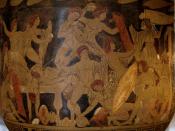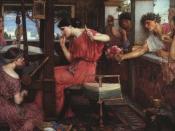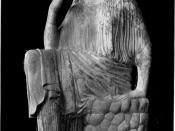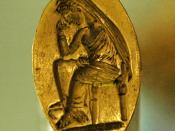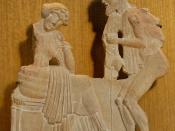The Untrusted Suitor Have you ever said one thing but done another, or do you act differently around certain people? Some people try to impress others with their words although their actions may suggest something quite different. Eurymakos, a suitor in the epic The Odyssey, Homer, translated by Robert Fitzgerald, displays different personalities. Although he wants Penelope and Telemakos to believe he is shameless, his actions around the other suitors suggest otherwise. To better understand the situation, it is important to know why Eurymakos feels the need to impress Penelope and Telemakos. All of the suitors, including Eurymakos, are competing among each other for Penelopes' hand in marriage. It seems practical that a prospecting husband would act sincere to the lady and her son, if the suitor wishes to be the chosen one. Most of what Eurymakos says to Penelope and Telemakos are lies, but he betters his chance at becoming the chosen husband.
His relationship with the other suitors is in sheer competitiveness. He is eager to impress them and because of this, it makes him one of the most untrusting suitors in the book.
To upset either Penelope or Telemakos would only jeopardize his chance at becoming the next husband. That is why the book shows Eurymakos behaving wisely to Penelope and son. On one hand, Eurymakos seems genuine to the needs of both Penelope and Telemakos. When Telemakos feels as if his home is in havoc, Eurymakos assures him that he himself is only interested in his mother and does not wish to consume the property. Eurymakos also tries to comfort Penelope when she fears her son is in danger by telling her that he will see that no harm will come to Telemakos. As he continues to tell Penelope and Telemakos the things he thinks they want to hear, he charms his position with gifts and compliments. "Beauty like yours no woman had before, or majesty, or mastery," is one such use of his talents for impressing Penelope (pg 344). Because of this, and the gifts he bestows to her, he is the most probable to win Penelopes hand in marriage.
Eurymakos may act sincere around Penelope and Telemakos, but he displays a bolder, less sensitive behavior while around the suitors. He is in constant competition with Antinoos, a leader figure to the other suitors. When Antinoos expresses his opinions towards things, Eurymakos is quick at taking a stand in agreement if the other suitors share the same feelings. After Antinoos throws a stool at Odysseus, Eurymakos, in competition, shows he too is strong by imitating Antinoos' actions. At times, it is difficult to tell how Eurymakos really feels towards a situation. He works with Antinoos by helping him plan the death of Telemakos, but then reassures Penelope that her son is in no harm. His image of what others think about him seems very important to him. Although Eurymakos displays different images, his main focus is on strength and power. When Odysseus impersonates a beggar and wants to try his chance with the bow, Eurymakos gets very angry. "Our ears burn at what men might say and woman, too. We hear some jackel whispering, 'How far inferior to the great husband her suitors are! Can't even budge his bow! Think of it, and a beggar, out of no where, string it quick and made the needle shot!' That kind of disrepute we would not care for," Eurymakos tells Penelope (pg 401). This behavior shows how important his manly image is recognized by all. As one the the two strongest suitors, Eurymakos does not want others to think he is less of a man.
Wanting all to respect and like a person is not all bad. If an individual is careful with their actions, people will begin to admire them. The problem is that no one can please everybody. Eurymakos tries but the reader can never believe his intentions. He takes a risk with Penelope each time he sides with Antinoos. He sleeps with one of Penelope's maids even though he desires to lay with Penelope. Even in the end, Eurymakos, begging for mercy, admits to no wrongdoing. He tells Odysseus that Antinoos was to blame and that the suitors were forced to behave as they did. "Antinoos was the ringleader, he whipped us on to do these things," he tells Odysseus pleading for him to spare his life (pg 410). Eventually, Eurymakos and his deceitful ways got him nothing but a suitable death in Odysseus' honor.
Understandably so, Eurymakos was caught up in the moment, paying no attention to what complications would arise from his behavior. His intentions to please or out-do those around him brought him nothing positive. It is as if Eurymakos thought of himself only, not worrying about the feelings of others. He continued to tell Penelope and Telemakos lies even though his words only comforted them deceitfully and temporarily. If Eurymakos had not competed with Antinoos, Antinoos would have been in total power. Even though both were evil, Eurymakos being less so, made it harder for Antinoos to gain complete control. Eurymakos could have been better to Penelope and Telemakos by standing up for them against the other suitors, but in the end, it would not have mattered anyway. "Revulsion, anguish in his heart, with both feet kicking out, he downed his chair, while the shrouding wave of mist closed on his eyes" (pg 412). As faith would have it, all suitors were to visit the land of death, and Odysseus prophecy was delightfully fulfilled.
Work Cited Homer. The Odyssey. Translated by Fitzgerald, Robert.
New York: Random House, 1990
